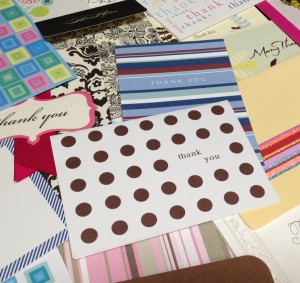I admit I’m guilty of missing more than a few thank you cards for gifts received over the years. I’m a horrible role model when it comes to thank you letter etiquette. Except in a career context.
Except in a career context.
When it comes to managing a career I’m an etiquette convert, a lover of hand-written note cards, and a believer in the power of saying a proper thank you.
In an age when you have to struggle to stand out and get noticed by employers, the best advice I can give you is to see where the herd is going and head the other direction.
If everybody is looking online for jobs, focus your energy on finding opportunities through the people in your network. If “nobody” is writing thank you letters, the easiest way to stand out is to be the one who does.
Employers regularly tell us: “Follow up is key,” that students should “Always send a thank you,” and that it is vital to send that thank you promptly.
As you go through your college experience you’ll have many opportunities to stand out from the crowd by sending a brief, sincere, and hand-written thank you.
If you’d like to be remembered by someone you interact with, sending a thank you card/note/letter will help you stick in their memory.
A career fair employer you have a great conversation with deserves a thank you, as does a speaker who comes to your class that you really enjoyed. Anyone that you interview with or who gives you even a few minutes of their time to help you with your career direction should be thanked appropriately. It’s good practice, and if you do it regularly it gets easier and easier to come up with the right words.
E-mail vs. Hand-written?
Once students are convinced of the need for thank you letters there is always a discussion about e-mail vs. typed letters vs. the handwritten letter. There is a hierarchy to them, and I think you can guess which fits where.
The hand-written note takes the most care, provides an opportunity to showcase personal style, and makes the longest lasting impression. I have a drawer full of thank you cards from students and professionals I’ve worked with over the years, and I remember every single one of their names. E-mails? Not so much.
My recommendation is to think about whether expediency trumps the need to stand out. Sometimes speed is of the essence. But even a speedy e-mail can be followed by a hand-written note.
Read more: Tips for writing thank yous

Sue Dahlin, CES Employer Relations Manager: “When I was a kid, I wanted to be a professional reader when I grew up. Not a writer, not a critic, not an editor, just a reader. I still haven’t found anyone willing to pay me to read.”
Questions about employers coming to campus? Drop-in to Sue’s office hours on Tuesdays, 2:30 to 4:30 p.m.
© 2010, 2014 Career and Employment Services, University of Puget Sound
Photo credits: Thank you cards, Kris Hay; Sue’s headshot, Ross Mulhausen
Good information on the importance of thank you notes. I’m pretty confident that I would not have received a job offer after flubbing an interview question if I hadn’t used the thank you note as an opportunity to restate (more eloquently) what I should have said in the interview. It worked since I got the job. Thank you notes are often the last chance at a good first impression.
This post is a great reminder of the importance of thank-you notes. They’re so easy to write, and make such a good impression, but can be so easily forgotten. When I used to interview students for internships, a thank-you note could place someone ahead of another candidate in the selection process. Now, as a student again, I’m on the other side of the table but still remember how much it meant to me, as an interviewer, to receive a thank-you (handwritten, of course!)